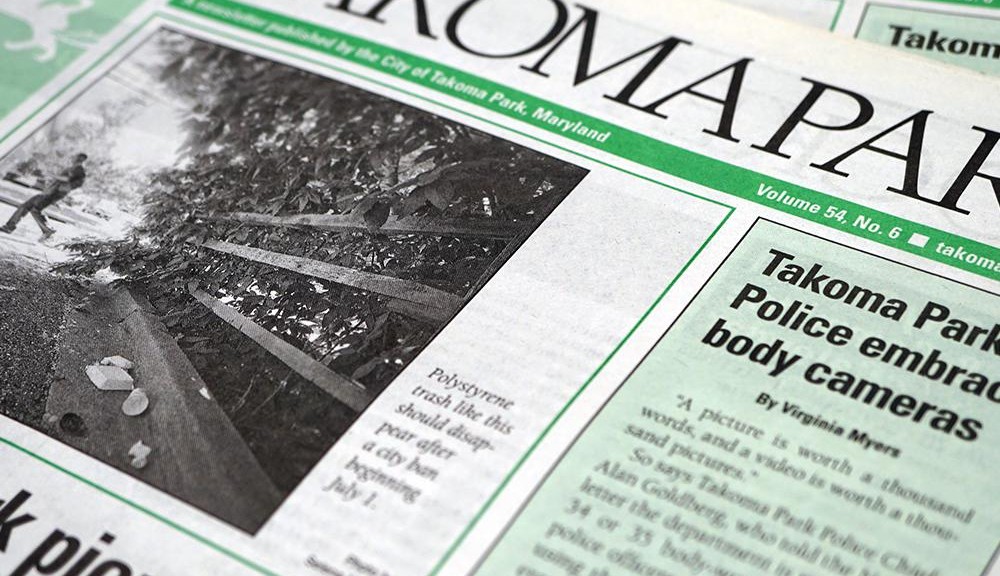By Helen Lyons
While factories abroad mass produce low-priced picture frames by the thousands using the latest in high-tech machinery, in Takoma Park some things are still done the old-fashioned way.
“It’s more work, a lot of labor, ragged fingers and working late at night to make what ends up being minimum wage, but there’s something really gratifying about it,” said Mark Howard of his chosen profession. Howard of Takoma Picture Framers has been at the helm of a family business that dates back to the forties, perfecting a craft even older than that.
“This is kind of an old world type of shop,” he explained, standing before shelves that seem to stretch on for miles in the basement of 7312 Carroll Ave. Upon them are countless cuts of wood, meticulously organized and waiting to be assembled carefully by hand into frames for photos, prints and original works of art.
They come in seemingly every type and color, from oak to gold-leaf, and some were once the property of the National Gallery of Art where Howard’s father Alden’s first frames were sold.
“He worked for a framer downtown on Constitution Avenue,” Howard said, “and at the same time was going to the Corcoran School of Art, and visiting the National Gallery and doing sketches of the oil paintings that hung there.”
His employer had a contract with the National Gallery of Art, and in 1950 when Alden Howard Jr. wasn’t learning the skill of framing, he was flirting with a woman at the coat check who would later become his wife.
“For twenty years he built frames,” Howard recalled. “My earliest memories are of my father and my uncle downstairs in the basement sawing and sanding and painting and clipping and wrapping and creating frames for the National Gallery that were sold in the gift shop.”
But in 1970, the end of that contract brought the Howard family to Takoma Park, where Willard and Katherine Atherley owned and operated the first ever framing store in all of Maryland out of a downtown row home that had once been a bakery.
There were still commercial baking pans and cupcake trays in the home above the storefront when Alden Jr. bought the store from the Atherley’s, but soon they were replaced with paints, putties, sandpaper and pieces of whalebone used to perfect the edging of a matte.
Not much changed when the business switched hands, including some of the help (Katherine stayed on as a part time employee.) and the name.
In the 1970s, Takoma Picture Framers was still one of the only framing places in town, and Mark Howard remembered lines out the door. “We were open to nine o’clock at night and we had lines of people here and they wouldn’t leave. We’d be up until ten, eleven o’clock taking orders.”
But business isn’t exactly booming today, nearly 70 years after the shop first opened. Mark Howard took over the business from his father in the year 2000, and now it’s only him behind the counter, instead of the whole family and an apprentice or two.
But Howard still burns the midnight oil from time to time, working past nightfall above the shop mixing paints and putties and operating the same old pressing machine that his father used in the 70’s to fulfil his clients’ orders. He even has his father’s old whalebone tool, well over half a century old.
“It’s not really worth it monetarily,” Howard admits, gazing around the shop with its creaking stairs, sloping floors and family of squirrels embedded in the walls upstairs. “I had to find a way within myself to say, well, I took over Dad’s business. I’m doing it for him.”
And even on a freezing winter’s day, the buzzer just outside the door rings. A customer has arrived. She’s moved to Takoma Park just recently and is looking to have something framed for her new home.
While Howard gives her a short version of his shop’s rich history, she notices a book with her mother’s name as the title amongst the collection of old keepsakes Mark has for sale at the front of the store (his “yard sale,” he calls it). She’s delighted.
There’s a CVS Pharmacy on Carroll Avenue and a new Walmart just six minutes away on Rigg’s Road, but in Takoma Park, these “old world types of shop” and the dedicated people who run them still manage to charm.
This article appeared in the February 2017 edition of the Takoma Park Newsletter. The Takoma Park Newsletter is available for download here.

